英语的一般将来时态归纳及用法
高中英语知识点归纳动词的一般将来时
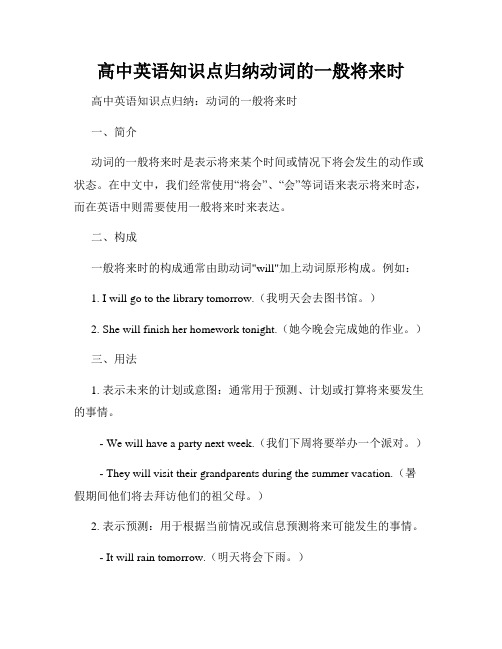
高中英语知识点归纳动词的一般将来时高中英语知识点归纳:动词的一般将来时一、简介动词的一般将来时是表示将来某个时间或情况下将会发生的动作或状态。
在中文中,我们经常使用“将会”、“会”等词语来表示将来时态,而在英语中则需要使用一般将来时来表达。
二、构成一般将来时的构成通常由助动词"will"加上动词原形构成。
例如:1. I will go to the library tomorrow.(我明天会去图书馆。
)2. She will finish her homework tonight.(她今晚会完成她的作业。
)三、用法1. 表示未来的计划或意图:通常用于预测、计划或打算将来要发生的事情。
- We will have a party next week.(我们下周将要举办一个派对。
) - They will visit their grandparents during the summer vacation.(暑假期间他们将去拜访他们的祖父母。
)2. 表示预测:用于根据当前情况或信息预测将来可能发生的事情。
- It will rain tomorrow.(明天将会下雨。
)- He will become a famous writer in the future.(他将来会成为一名著名作家。
)3. 表示习惯性行为:用于描述一般性的将来情况,在特定条件下发生的动作或状态。
- The train will arrive at 9 a.m. every day.(列车每天早上9点到达。
)- He will always help others when they are in need.(当别人需要帮助时,他总是会帮助。
)4. 表示可能性:用于表示某事可能在将来发生,但并不确定。
- She will probably pass the exam.(她可能会通过考试。
)- It might rain later.(天气可能会变雨。
英语语法—一般将来时态
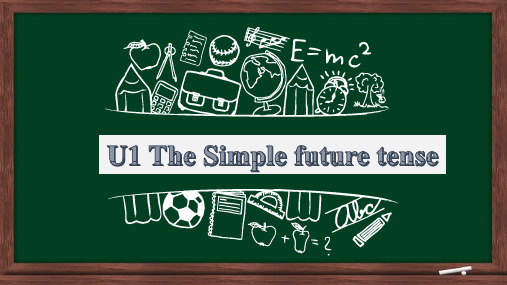
eg. My uncle is coming to see me tomorrow.
五、一般将来时特殊句式
1. There be 句式的一般将来时
Eg. There will be +其他 There is going to be+其他
2. 客观事实用一般现在
情态动词 (1)can/could:能够 could逾期 更委婉 (2)May/might 许可,准许 (3)Should 应该 主观义务
Have to 必须、不得不 (4)Must 主观必须,Must...?Yes,you must/no,you needn’t
Mustn’t 禁止 (5)Need 需要 Need...?Yes,you must/no,you needn’t
三、一般将来时 时间状语
Tomorrow、 Next week/month/year、 in+时间段、 this evening、 in the near future
四、一般将来时例句
1. 表示将来某个时间要发生的事 情或存在的状态。
eg.We will clean the room next week.
一、一般将来时用法(4)
1. 表示将来某个时间要发生的事 情或存在的状态。
3.条件、时间状语从句中,用一般 现在时表将来。
2. be going to 表示将要发生 或者打算、计划要做的事情,或者 可能发生的事情
4.go、come、leave、start等进行 时态表将来。
二、一般将来时结构 1. will / shall + 动词原形
Will / Shall +主语 + 动原 ?
初中英语知识点归纳一般将来时的用法
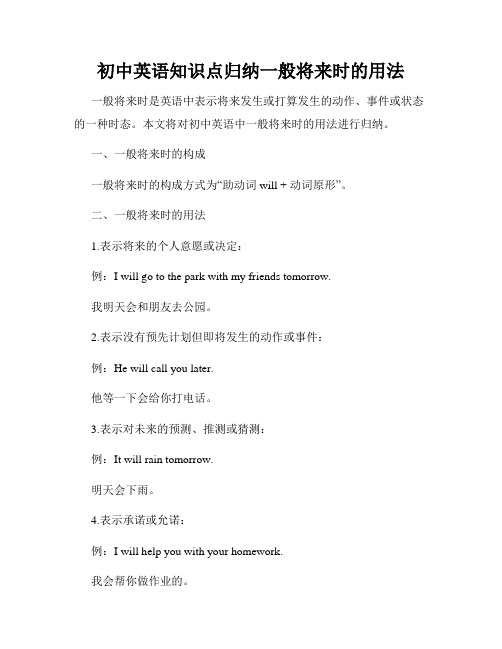
初中英语知识点归纳一般将来时的用法一般将来时是英语中表示将来发生或打算发生的动作、事件或状态的一种时态。
本文将对初中英语中一般将来时的用法进行归纳。
一、一般将来时的构成一般将来时的构成方式为“助动词 will + 动词原形”。
二、一般将来时的用法1.表示将来的个人意愿或决定:例:I will go to the park with my friends tomorrow.我明天会和朋友去公园。
2.表示没有预先计划但即将发生的动作或事件:例:He will call you later.他等一下会给你打电话。
3.表示对未来的预测、推测或猜测:例:It will rain tomorrow.明天会下雨。
4.表示承诺或允诺:例:I will help you with your homework.我会帮你做作业的。
5.表示对现在情况的预测或推测:例:She will be here soon.她马上就会到这里。
6.表示征求意见或征询意见:例:Will you come to the party tomorrow?明天你会来参加派对吗?7.表示习惯性或经常性的动作:例:He will often go swimming on weekends.他经常在周末去游泳。
三、一般将来时的否定与疑问句1.否定句构成:在will后面加not。
例:He will not come to the meeting tomorrow.他明天不会来开会。
2.疑问句构成:将助动词will提到句子的主语前面。
例:Will you pass me the salt, please?请你把盐递给我好吗?四、一般将来时的时间状语一般将来时可以与一些表示将来时间的时间状语连用,如:tomorrow,next week,in the future等。
例:I will visit my grandparents next week.我下周会去拜访我的祖父母。
高中英语十六种时态用法详解之一般将来时

要
发
生
的
事
情
。
如
:
Wearegoingtohaveameetingtodiscussthemattert
hisevening. 今 天 晚 上 开 会 讨 论 这 件 事 情 。
Lookattheblackcloudsoverthere.Ithinkitisgoi
ngtorainsoon.看一看那边的乌云,我想天要下雨
高中英语十六种时态用法详解之一般将来时 网为大家整理了高中英语的众多知识点归纳、 考点总结、以及复习资料,供各位学生和家长参考。
希望大家能从中得到收获,谢谢您的支持和采纳! 1.一般将来时的定义一般将来时表示在现在
看来即将要发生的动作或存在的状态。常用时间副 词 sometime tomorrow,soon 做 状 语 或 。 短 如 语 : nextyear/week/month,inafewdays,inthefuture,
商店就要关门了。(6)一般现在时。表示一种严格 按照计划进行的动作。比方说,上课、飞机起飞、 火 车 离 站 等 。 如 : Don ’ thurry.Themeetingstartsataquarterpasteight. 不 要 匆 忙 , 回 忆 八 点 过 一 刻 开 始 。 Thebusgoesbackatfourthirty.汽车四点返回。
么
时
istobepletedbytheendofthisyear. 这
渡桥该在今年年底前完工。(4)beaboutto+动词原 形。表示就要做或正好要做的事情。往往暗含一种 时间上的巧合,因此,句子不能再用时间状语。如: Don’tleave.LiLeiisabouttoe.不要走了,李蕾就 要来了。Bequiet.Theconcertisabouttostart.安 静下来,音乐演唱会就要开始了。 (5)be+现在分词。
英语一般将来时

英语一般将来时英语一般将来时,又称为未来时态,是用来表示将来会发生的动作、事件或状态的一种时态。
它的构成通常由"will" 或 "be going to" 加上动词原形来表示。
下面将详细介绍英语一般将来时的用法。
一、"will"的用法:1. 表示将来的决心、意图、打算或做出的决定。
例如:I will help you with your homework after dinner.(晚饭后我会帮你做作业。
)2. 表示对将来的预测、推测或猜测。
例如:It will rain tomorrow.(明天会下雨。
)3. 表示对将来的自然趋势、发展或趋势。
例如:Technology will continue to advance in the future.(科技将来会继续发展。
)4. 表示对将来的保证、允诺、请求或建议。
例如:I promise I will be on time for the meeting.(我保证会准时参加会议。
)二、"be going to"的用法:1. 表示对将来已经计划或决定好的事情。
例如:I am going to visit my grandparents this weekend.(这个周末我打算去看望我的祖父母。
)2. 表示对将来可能发生的事情有一种预见或判断。
例如:Look at those dark clouds. It's going to rain.(看那些乌云,将要下雨了。
)3. 表示以现有证据或迹象预测未来。
例如:She's been studying very hard. She's going to pass the exam.(她一直学得很努力,她一定会通过考试的。
)三、注意事项:1. 一般将来时中的时间状语词可以是今天、明天、以后、将来、下个月等表示将来的时间状语词。
英语动词时态用法归纳:一般将来时

英语动词时态用法归纳:一般将来时一、一般将来时的构成一般将来时的由s hall / will+ 动词原形构成。
二、一般将来时的基本用法(1) 表示单纯的将要发生的动作或情况。
常与表示将来的时间状语连用。
如:Tomorrow will be Sunday. 明天是星期天。
They say that it will rain. 他们说要下雨。
I’ll be thirty-seven on my next birthday. 到下次生日,我就三十七岁了。
We won’t be free tonight. 今晚我们没空。
(2) 也可以表示临时决定要做的事。
如:—I thought I asked you to sweep the floor.—O h, I’m sorry. Mother, I will do it right now.—我原以为我让你扫地了。
—噢,对不起,妈妈,我就做。
—You have left the door open.—O h, so I have. I’ll go and lock it.—你忘了锁门。
—哦,是的。
我就去。
(3) 有时虽没有时间状语,但从意思上可以判断指将来的动作。
如:Who will take the chair? 谁当主席?You will pass the examination. 你会通过那个考试的。
The meeting won’t last long. 会开不了多久。
(4) 一般将来时有时还表示倾向和习惯性。
如:Oil will float on water. 油总浮在水面上。
Fish will die without water。
鱼离开水就会死掉。
The machine won't work because of a faulty connection. 机器电源线接错了,所以开不动。
三、表示将来时的几种方法(1) be going to+动词原形。
一般将来时的五种表达方法
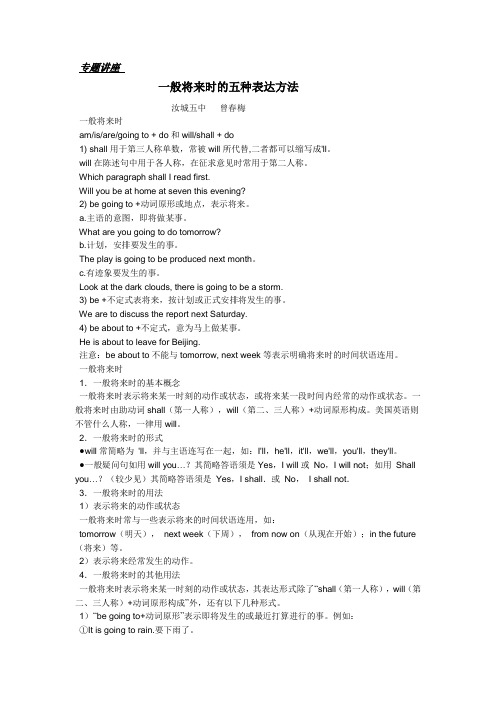
专题讲座一般将来时的五种表达方法汝城五中曾春梅一般将来时am/is/are/going to + do和will/shall + do1) shall用于第三人称单数,常被will所代替,二者都可以缩写成'll。
will在陈述句中用于各人称,在征求意见时常用于第二人称。
Which paragraph shall I read first.Will you be at home at seven this evening?2) be going to +动词原形或地点,表示将来。
a.主语的意图,即将做某事。
What are you going to do tomorrow?b.计划,安排要发生的事。
The play is going to be produced next month。
c.有迹象要发生的事。
Look at the dark clouds, there is going to be a storm.3) be +不定式表将来,按计划或正式安排将发生的事。
We are to discuss the report next Saturday.4) be about to +不定式,意为马上做某事。
He is about to leave for Beijing.注意:be about to不能与tomorrow, next week等表示明确将来时的时间状语连用。
一般将来时1.一般将来时的基本概念一般将来时表示将来某一时刻的动作或状态,或将来某一段时间内经常的动作或状态。
一般将来时由助动词shall(第一人称),will(第二、三人称)+动词原形构成。
美国英语则不管什么人称,一律用will。
2.一般将来时的形式●will常简略为'll,并与主语连写在一起,如:I'll,he'll,it'll,we'll,you'll,they'll。
英语时态:一般将来时

英语时态:一般将来时一般将来时(simple future tense)表示将来某一时段的动作或状态,或将来某一段时间内经常的动作或状态。
一般将来时常常和表示将来的时间状语连用。
如:tomorrow, next week, in the future, in a year等。
Ⅰ. 句法结构【仅讨论陈述句和疑问句两种语式】:1.陈述句:A. 肯定形式:主语+be going to /will/shall +动词原形+其他B. 否定形式:主语+be not going to /will not/shall not+动词原形+其他注:a. 在直接在助动词后加not。
b. be going to结构中的be仅指am, is, are三个be动词。
c. will/shall+动原结构在谓语两态变化中无人称和数的变化。
d. 一般情况下,仅表示时态时,shall用于第一人称,will用于第二、三人称;表示说话人强烈意愿和语气时则用法相反。
2.疑问句:A. 一般疑问句:助动词提前即可①Be动词+主语+ going to +动词原形+其他②Will/Shall+主语+动词原形+其他B.特殊疑问句:特殊疑问词+一般疑问句(同上)3.被动语态:主语+ 助动词(结构) + be +动词过去分词【被动结构be done,时体现在助动词】➢两态变化例句参考下表(以will为例):Ⅰ. 主要用法及结构:1.【一般将来时表将来】一般将来时表示将要发生的动作或情况。
A.will/shall +动原I will(shall) arrive tomorrow.Will you be free tonight?B.be going to+动原a.表示计划、打算、准备做的事。
We are going to put up a building here.b.表示即将发生或肯定要发生的事。
I think it is going to snow.注:在一般将来时的句子中,有时有表示将来时间的状语,有时没有时间状语,这时要从意思上判断是否指未来的动作或情况。
英语一般将来时用法总结(完整)
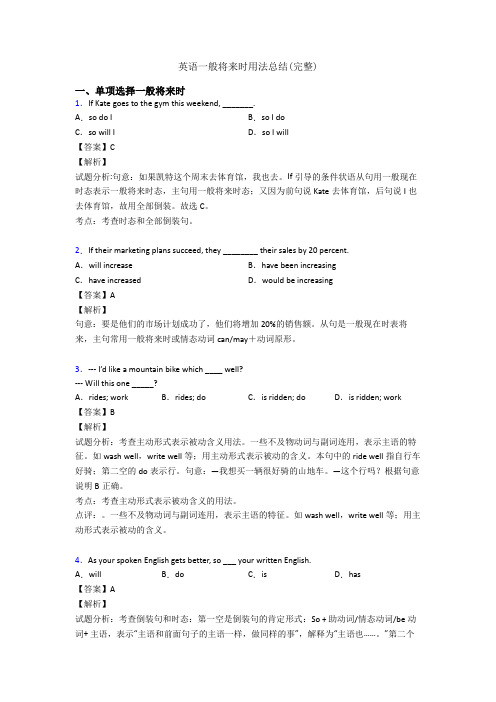
英语一般将来时用法总结(完整)一、单项选择一般将来时1.If Kate goes to the gym this weekend, _______.A.so do I B.so I doC.so will I D.so I will【答案】C【解析】试题分析:句意:如果凯特这个周末去体育馆,我也去。
If引导的条件状语从句用一般现在时态表示一般将来时态,主句用一般将来时态;又因为前句说Kate去体育馆,后句说I也去体育馆,故用全部倒装。
故选C。
考点:考查时态和全部倒装句。
2.If their marketing plans succeed, they ________ their sales by 20 percent.A.will increase B.have been increasingC.have increased D.would be increasing【答案】A【解析】句意:要是他们的市场计划成功了,他们将增加20%的销售额。
从句是一般现在时表将来,主句常用一般将来时或情态动词can/may+动词原形。
3.--- I’d like a mountain bi ke which ____ well?--- Will this one _____?A.rides; work B.rides; do C.is ridden; do D.is ridden; work【答案】B【解析】试题分析:考查主动形式表示被动含义用法。
一些不及物动词与副词连用,表示主语的特征。
如wash well,write well等;用主动形式表示被动的含义。
本句中的ride well指自行车好骑;第二空的do表示行。
句意:—我想买一辆很好骑的山地车。
—这个行吗?根据句意说明B正确。
考点:考查主动形式表示被动含义的用法。
点评:。
一些不及物动词与副词连用,表示主语的特征。
如wash well,write well等;用主动形式表示被动的含义。
16种英语时态 一般将来时

16种英语时态一般将来时表示将要发生的动作或存在的状态及打算,计划或准备做1.时间状语:tomorrow.next day.soon.in a few minutes.by·the day after tomorrow2.基本结构:主+am/is./are+going to +do,will/shall+do否定式:am/is/are+not going to+do, will/shall+not do一般疑问句:be+·will/shall+·3.基本用法:[1]a.表示将来时间的动作或状况Eg:they are going to have a competition with us in studies.B.用于真实条件句和时间状语从句的主句中表示将来的情况Eg:i’ll tell you as soon as he comesC.用于条件状语从句表示愿望或意愿Eg:if you will wait for me,i shall come back soonD.表示一种倾向或习惯性动作Eg:the shop won’t openn until nine.[2]a.be going to+v原(表示打算或准备好要做的事或有迹象表明要发生的事情)Eg:what are you going to do during the summer holidayB.be+v-ing 有些v的现在进行时表示将要发生的动作,表示按计划或安排即将发生的事情,如:go come leave start arrive Eg:jenny is coming to supper this evening.C.be to +v原表示约定命令或按计划要做的事情D.be about to +v原表示将要马上Eg:he is about toleave附加:1.be going to ---- be toBe to 表示客观安排或受人指示而做某事Eg:i am to play football tomorrowBe going to 表示主观的打算或计划Eg:i am going to play football tomorrow2.be going to ---- will用于条件句时,be going to 表将来will表意愿eg:if you are going to make a journey,you’d better get ready for it as soon as possibleNow if you will take off your clothes,we will fit the new clothes on you in front of the mirror.。
英语一般将来时态的用法及例句分析
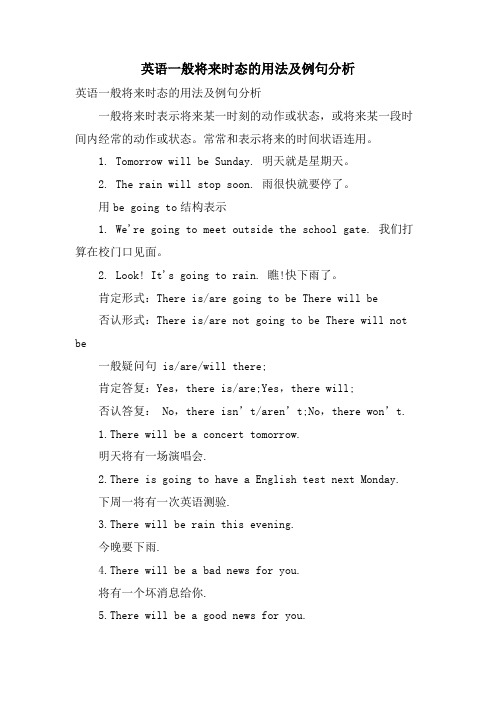
英语一般将来时态的用法及例句分析英语一般将来时态的用法及例句分析一般将来时表示将来某一时刻的动作或状态,或将来某一段时间内经常的动作或状态。
常常和表示将来的时间状语连用。
1. Tomorrow will be Sunday. 明天就是星期天。
2. The rain will stop soon. 雨很快就要停了。
用be going to结构表示1. We're going to meet outside the school gate. 我们打算在校门口见面。
2. Look! It's going to rain. 瞧!快下雨了。
肯定形式:There is/are going to be There will be否认形式:There is/are not going to be There will not be一般疑问句 is/are/will there;肯定答复:Yes,there is/are;Yes,there will;否认答复: No,there isn’t/aren’t;No,there won’t.1.There will be a concert tomorrow.明天将有一场演唱会.2.There is going to have a English test next Monday.下周一将有一次英语测验.3.There will be rain this evening.今晚要下雨.4.There will be a bad news for you.将有一个坏消息给你.5.There will be a good news for you.将有一个好消息给你.6.There will be a English class this afternoon.今天下午有一节英语课.7.There will be a show on the playground the day after tomorrow.后天操场上将有一场表演.8.There will be a mobile phone tomorrow for me.明天我将有一部 .9.There will be television in our classroom.我们教室将有一台电视机.10.There will be a new dress for her.她将有一条新裙子.11.There will be a delicious supper for us .我们将有一顿美味的晚餐.12.There will be a gift for me.我将有一份礼物.13.There will be a fortable room for you tomorrow.明天你将有一个舒适的'房间.14.There will be a romantic wedding for you tomorrow.明天你将有一场浪漫的婚礼.15.There will be a happy journey for her.她将有一个愉快的旅程.1、Both his parents look sad . Maybe they what's happened to him .A. knewB. have knownC. must knowD.will know2、He has been to Shanghai , has he ?A. alreadyB.neverC.everD. still3、Have you met Mr Li ?A. justB. agoC.beforeD. a moment ago4、The famous writer one new book in the past two year .A. is writingB.was writingC.wroteD.has written5、—Our country a lot so far .—Yes . I hope it will be even .A. has changed ; wellB. changed ; goodC. has changed ; betterD. changed ; better6、Zhao Lan already in this school for two years .A. was ; studyingB. will ; studyC. has ; studiedD. are ; studying。
英语一般将来时用法总结含解析

英语一般将来时用法总结含解析一、初中英语一般将来时1.—You'd better take an umbrella. The weather report says it in the afternoon.— Thank you. I will put one in my bag.A. will rainB. rainsC. is raining【答案】 A【解析】【分析】句意:——你最好带把伞。
天气预报说是下午要下雨。
——谢谢你。
我会在包里放一个。
A一般将来时,B一般现在时,C现在进行时,根据 in the afternoon和 Iwill put one in my bag 可知时态是一般将来时,故选A。
【点评】考查时态,注意一般将来时的用法。
2.-- Tommy, do you know if they _____ to the zoo this Sunday if it _____?-- Sorry, I have no idea.A. will go; is fineB. go; is fineC. will go; is going to be fineD. go; will be fine【答案】 A【解析】【分析】句意:——Tommy,你知道这个星期天如果晴天他们是否去动物园吗?——对不起,我不知道。
第一个空前的if引导宾语从句,意思是“是否”,根据从句的tomorrow可知用一般将来时;第二个空前的if引导条件状语从句,意思是“如果”,从句中用一般现在时表示将来,故选A。
【点评】考查动词的时态。
3.I don't know if my brother _____________ here tomorrow. If he _____________, I'll call you.A. comes; comesB. will come; comesC. comes; will comeD. will come; will come【答案】 B【解析】【分析】句意:我不知道是否我哥哥明天将来,如果他来,我将给你打电话。
一般将来时时态用法讲解(最新整理)
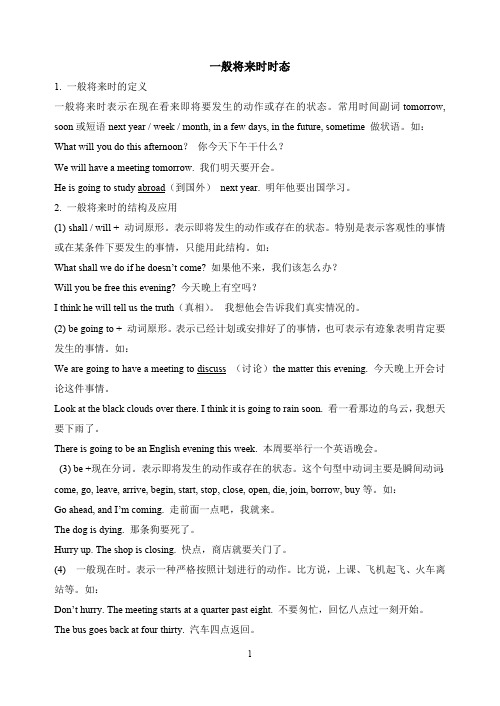
一般将来时时态1. 一般将来时的定义一般将来时表示在现在看来即将要发生的动作或存在的状态。
常用时间副词tomorrow, soon或短语next year / week / month, in a few days, in the future, sometime 做状语。
如:What will you do this afternoon?你今天下午干什么?We will have a meeting tomorrow. 我们明天要开会。
He is going to study abroad(到国外)next year. 明年他要出国学习。
2. 一般将来时的结构及应用(1) shall / will + 动词原形。
表示即将发生的动作或存在的状态。
特别是表示客观性的事情或在某条件下要发生的事情,只能用此结构。
如:What shall we do if he doesn’t come? 如果他不来,我们该怎么办?Will you be free this evening? 今天晚上有空吗?I think he will tell us the truth(真相)。
我想他会告诉我们真实情况的。
(2) be going to + 动词原形。
表示已经计划或安排好了的事情,也可表示有迹象表明肯定要发生的事情。
如:We are going to have a meeting to discuss (讨论)the matter this evening. 今天晚上开会讨论这件事情。
Look at the black clouds over there. I think it is going to rain soon. 看一看那边的乌云,我想天要下雨了。
There is going to be an English evening this week. 本周要举行一个英语晚会。
(3) be +现在分词。
表示即将发生的动作或存在的状态。
一般将来时的用法及常见句型总结

一般将来时的用法及常见句型总结一般将来时是英语中用来表示将来发生的动作或状态的一种时态。
在句子中,一般将来时通常与表示将来的时间状语词搭配使用,如tomorrow(明天)、next week(下周)、in the future(将来)等。
同时,一般将来时也可以使用助动词will或shall来构成。
下面将介绍一般将来时的用法及常见句型。
1. 一般将来时的肯定句结构:主语 + will/shall + 动词原形 + 其他成分例如:- I will go to the park tomorrow.(我明天将去公园。
)- They will watch a movie tonight.(他们今晚将要看电影。
)2. 一般将来时的否定句结构:主语 + will/shall + not + 动词原形 + 其他成分例如:- She will not join the party.(她不会参加派对。
)- We shall not travel to Europe.(我们不会去欧洲旅行。
)3. 一般将来时的疑问句结构:Will/Shall + 主语 + 动词原形 + 其他成分?- Will you come to the concert?(你会来听音乐会吗?)- Shall we visit the museum tomorrow?(我们明天要参观博物馆吗?)4. 一般将来时的特殊用法:a. 表示计划或安排例如:- We will have a meeting next Monday.(我们下周一要开会。
)- They will go on a vacation in August.(他们八月份将去度假。
)b. 表示意愿或意图例如:- He will help you with your homework.(他愿意帮你做作业。
)- She shall buy a new car soon.(她打算很快买辆新车。
)c. 表示预测或推断例如:- It will rain tomorrow.(明天会下雨。
英语一般将来时态基本结构及用法
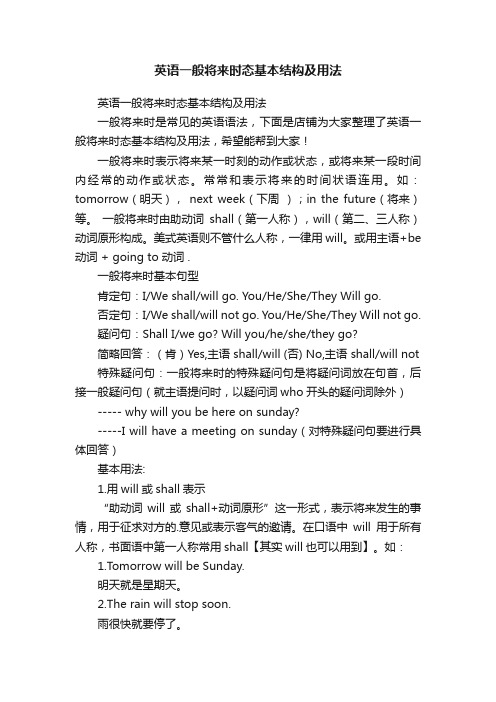
英语一般将来时态基本结构及用法英语一般将来时态基本结构及用法一般将来时是常见的英语语法,下面是店铺为大家整理了英语一般将来时态基本结构及用法,希望能帮到大家!一般将来时表示将来某一时刻的动作或状态,或将来某一段时间内经常的动作或状态。
常常和表示将来的时间状语连用。
如:tomorrow(明天),next week(下周);in the future(将来)等。
一般将来时由助动词shall(第一人称),will(第二、三人称)动词原形构成。
美式英语则不管什么人称,一律用will。
或用主语+be 动词 + going to 动词 .一般将来时基本句型肯定句:I/We shall/will go. You/He/She/They Will go.否定句:I/We shall/will not go. You/He/She/They Will not go.疑问句:Shall I/we go? Will you/he/she/they go?简略回答:(肯)Yes,主语 shall/will (否) No,主语 shall/will not 特殊疑问句:一般将来时的特殊疑问句是将疑问词放在句首,后接一般疑问句(就主语提问时,以疑问词who开头的疑问词除外)----- why will you be here on sunday?-----I will have a meeting on sunday(对特殊疑问句要进行具体回答)基本用法:1.用will或shall表示“助动词will或shall+动词原形”这一形式,表示将来发生的事情,用于征求对方的.意见或表示客气的邀请。
在口语中will用于所有人称,书面语中第一人称常用shall【其实will也可以用到】。
如:1.Tomorrow will be Sunday.明天就是星期天。
2.The rain will stop soon.雨很快就要停了。
3.Shall we go there at five?我们五点钟去那儿?4.Will you please open the door?请你把门打开?2.用be going to结构表示"be going to+动词原形”用来表示事先考虑过的将要发生的动作以及已有迹象表明必将要发生的某事,意为“打算;就要”。
一般将来时不同的句型和用法
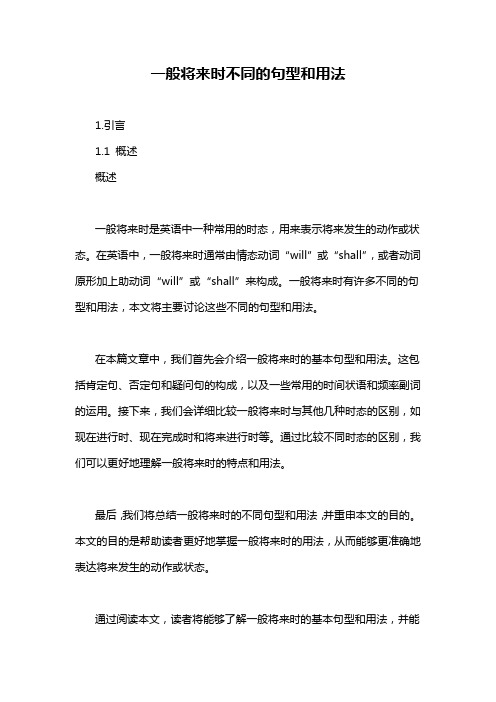
一般将来时不同的句型和用法1.引言1.1 概述概述一般将来时是英语中一种常用的时态,用来表示将来发生的动作或状态。
在英语中,一般将来时通常由情态动词“will”或“shall”,或者动词原形加上助动词“will”或“shall”来构成。
一般将来时有许多不同的句型和用法,本文将主要讨论这些不同的句型和用法。
在本篇文章中,我们首先会介绍一般将来时的基本句型和用法。
这包括肯定句、否定句和疑问句的构成,以及一些常用的时间状语和频率副词的运用。
接下来,我们会详细比较一般将来时与其他几种时态的区别,如现在进行时、现在完成时和将来进行时等。
通过比较不同时态的区别,我们可以更好地理解一般将来时的特点和用法。
最后,我们将总结一般将来时的不同句型和用法,并重申本文的目的。
本文的目的是帮助读者更好地掌握一般将来时的用法,从而能够更准确地表达将来发生的动作或状态。
通过阅读本文,读者将能够了解一般将来时的基本句型和用法,并能够区分一般将来时与其他时态的差别。
这将有助于提高读者的英语写作和口语表达能力,使其能够更自如地运用一般将来时来表达自己的意思。
接下来,我们将详细介绍一般将来时的基本句型和用法。
1.2 文章结构:本文将围绕一般将来时不同的句型和用法展开讨论。
整篇文章分为引言、正文和结论三个部分。
在引言部分,我们将对一般将来时进行概述,说明它所代表的时间以及它的基本用法和特点。
然后介绍本文的结构和目的,为读者提供一个整体的框架。
接下来进入正文部分,我们将首先详细介绍一般将来时的基本句型和用法。
我们将列举常见的句型,并给出相应的例句,以便读者更好地理解和掌握。
同时,我们还将提供一些常见的时间状语词,帮助读者更准确地运用一般将来时。
然后,我们将探讨一般将来时与其他时态的区别。
我们将与现在时、过去时进行对比,重点说明它们在表示时间和语态上的差异。
通过比较,读者将更清楚地了解一般将来时在句子中的独特作用。
最后,我们将在结论部分对一般将来时的不同句型和用法进行总结,并再次强调文章的目的。
一般将来时的知识点归纳整理
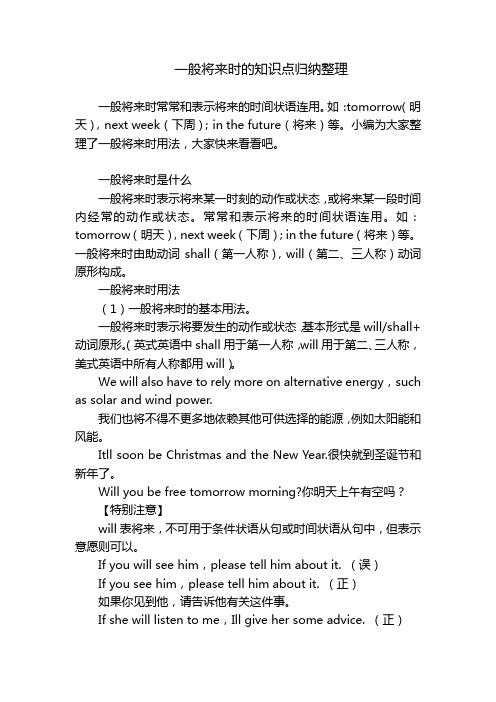
一般将来时的知识点归纳整理一般将来时常常和表示将来的时间状语连用。
如:tomorrow(明天),next week(下周);in the future(将来)等。
小编为大家整理了一般将来时用法,大家快来看看吧。
一般将来时是什么一般将来时表示将来某一时刻的动作或状态,或将来某一段时间内经常的动作或状态。
常常和表示将来的时间状语连用。
如:tomorrow(明天),next week(下周);in the future(将来)等。
一般将来时由助动词shall(第一人称),will(第二、三人称)动词原形构成。
一般将来时用法(1)一般将来时的基本用法。
一般将来时表示将要发生的动作或状态,基本形式是will/shall+动词原形。
(英式英语中shall用于第一人称,will用于第二、三人称,美式英语中所有人称都用will)。
We will also have to rely more on alternative energy,such as solar and wind power.我们也将不得不更多地依赖其他可供选择的能源,例如太阳能和风能。
Itll soon be Christmas and the New Year.很快就到圣诞节和新年了。
Will you be free tomorrow morning?你明天上午有空吗?【特别注意】will表将来,不可用于条件状语从句或时间状语从句中,但表示意愿则可以。
If you will see him,please tell him about it. (误)If you see him,please tell him about it. (正)如果你见到他,请告诉他有关这件事。
If she will listen to me,Ill give her some advice. (正)如果她愿意听我说,我会给她一些劝告。
【考试必备】常与一般将来时连用的时间状语有:next time下次tomorrow明天tomorrow evening明晚before long不久后in the future将来later(on)以后the day after tomorrow后天this afternoon今天下午next year明年(2)一般将来时的其他表达法。
四种将来时态的用法归纳

四种将来时态的用法归纳-标准化文件发布号:(9556-EUATWK-MWUB-WUNN-INNUL-DDQTY-KII四种将来时态的用法归纳一般将来时1.基本用法及表示方法。
一般将来时的基本用法是表示单纯的将来事实,由“will / shall + 动词原形”构成。
如 We shall have a lot of rain next month. 下个月将下很多雨。
I think she will pass the exam. 我想他考试会及格的。
2.表示将来时间的几种常见方法。
英语中除了“will /shall+动词原形”表示半来时态外,还可以有以下多种方法。
如:转自环球网校(1) 用“be going to+动词原形”表示。
主要表示打算和预测。
如:We are not going to stay there long. 我们不准备在那里多待。
(表打算)I’m afraid they’re going to lose the game. 恐怕他们会赛输。
(表预测)Look, it’s going to rain. 瞧,要下雨了。
(表预见)注:be going to 后接动词go和come时,通常直接改用其进行时态。
如:Where is he going to go / Where is he going 他打算到哪里去(2) 用“be to+动词原形”表示。
主要表示按计划或安排即将要发生的动作;有时也表示命令、禁止或可能性。
如:He is to leave for Beijing tomorrow. 他决定明天去北京。
Tell him he’s not to be back late. 告诉他不准迟回。
(3) 用“be about to+动词原形”表示。
主要表示即将要发生的事。
如:He is about to leave. 他即将要离开。
Sit down, everyone. The film is about to start. 大家坐好,电影马上就要开发始了。
英语一般将来时用法总结及解析
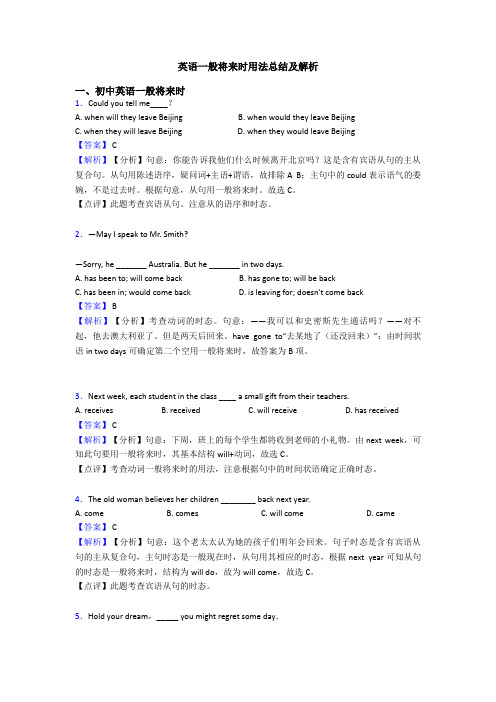
英语一般将来时用法总结及解析一、初中英语一般将来时1.Could you tell me____?A. when will they leave BeijingB. when would they leave BeijingC. when they will leave BeijingD. when they would leave Beijing【答案】 C【解析】【分析】句意:你能告诉我他们什么时候离开北京吗?这是含有宾语从句的主从复合句。
从句用陈述语序,疑问词+主语+谓语,故排除A B;主句中的could表示语气的委婉,不是过去时。
根据句意,从句用一般将来时。
故选C。
【点评】此题考查宾语从句。
注意从的语序和时态。
2.—May I speak to Mr. Smith?—Sorry, he _______ Australia. But he _______ in two days.A. has been to; will come backB. has gone to; will be backC. has been in; would come backD. is leaving for; doesn't come back【答案】 B【解析】【分析】考查动词的时态。
句意:——我可以和史密斯先生通话吗?——对不起,他去澳大利亚了。
但是两天后回来。
have gone to“去某地了(还没回来)”;由时间状语in two days可确定第二个空用一般将来时,故答案为B项。
3.Next week, each student in the class ____ a small gift from their teachers.A. receivesB. receivedC. will receiveD. has received【答案】 C【解析】【分析】句意:下周,班上的每个学生都将收到老师的小礼物。
- 1、下载文档前请自行甄别文档内容的完整性,平台不提供额外的编辑、内容补充、找答案等附加服务。
- 2、"仅部分预览"的文档,不可在线预览部分如存在完整性等问题,可反馈申请退款(可完整预览的文档不适用该条件!)。
- 3、如文档侵犯您的权益,请联系客服反馈,我们会尽快为您处理(人工客服工作时间:9:00-18:30)。
英语的一般将来时态归纳及用法一般将来时1.一般将来时的基本概念一般将来时表示将来某一时刻的动作或状态,或将来某一段时间内经常的动作或状态。
一般将来时由助动词shall(第一人称),will(第二、三人称)+动词原形构成。
美国英语则不管什么人称,一律用will。
2.一般将来时的形式●will 常简略为'll,并与主语连写在一起,如:I'll,he'll,it'll,we'll,you'll,they'll。
●一般疑问句如用will you…?其简略答语须是Yes,I will或No,I will not;如用Shall you…?(较少见)其简略答语须是Yes,I shall.或No,I shall not.。
3.一般将来时的用法1)表示将来的动作或状态一般将来时常与一些表示将来的时间状语连用,如:tomorrow明天,from now on从现在开始;in the future将来before long 不久in two weeks 在两周后next week / month / year /summer 下一周/月/ 年/夏天some day 将来的某一天soon 很快this evening 今天晚上this afternoon 今天下午the day after tomorrow 后天等。
2)表示将来经常发生的动作。
4.一般将来时的其他用法一般将来时表示将来某一时刻的动作或状态,其表达形式除了“shall(第一人称),will(第二、三人称)+动词原形构成”外,还有以下几种形式。
1)“to be going to+动词原形”表示即将发生的或最近打算进行的事。
例如:①It is going to rain. 要下雨了。
②We are going to have a meeting today. 今天我们开会。
will/shall + 动词原形”与“be going to + 动词原形”的用法区别在初中阶段“will / shall + 动词原形”与“be going to + 动词原形”这两种表示将来时的句型没什么太大的差别。
在现在英语中,特别是在口语中,一般更倾向于使用“be going to + 动词原形”这一句型,但两者主要区别还不在此。
“be going to + 动词原形”表示一个事先考虑好的意图,相当于中文的“打算”、“计划”、“准备”等。
“will / shall + 动词原形”则表示未经事先考虑而将要发生的情况,但是如果不清楚是否须先考虑还是未考虑的意图时,两者都可用。
“be + going to + 动词原形”的用法表示将要发生的事,或计划、打算或决定要做的事,根据不同的人称来选择be动词用am,is,are。
肯定句句型主语+ be ( am, is, are ) + going to + 动词原形eg. I’m going to go there next month. 下个月我将去那里。
He is going to visit his grandparents next year. 明年他将要去看望他的爷爷奶奶。
They are going to find a new house to live in. 他们将要找一所新房子住。
否定句句型主语+ be ( am, is, are ) + not + going to + 动词原形eg. He isn’t going to see the movie. 他不会去看电影。
You aren’t going to work on the farm this weekend. 这个周末你们不去家场劳动。
We aren’t going to have a meeting this afternoon. 今天下午我们不开会。
疑问句句型Be ( am, is, are ) + 主语+ going to + 动词原形eg. Are you going to have a party tomorrow? 明天你们要开联欢会吗?Is he going to write to his friends? 他要给他的朋友写信吗?Are they going to buy a new car? 他们要买一辆新车吗?特殊疑问句句型特殊疑问词+ be ( am, is, are ) + 主语+ going to + 动词原形eg. What are you going to have tomorrow? 明天你们要吃什么?What are you going to do tonight? I’m going to watch the baseball game.今晚你打算做什么?我想要看棒球赛。
2)go,come,start,move,sail,leave,arrive,stay等可用进行时态表示按计划即将发生的动作,例如:I'm leaving for Beijing.我要去北京。
3)“be to+动词原形”表示按计划要发生的事或征求对方意见。
例如:①Are we to go on with this work?我们继续干吗?②The boy is to go to school tomorrow.这个男孩明天要去上学。
4)“be about to+动词原形”表示即将发生的动作,意为:很快,马上。
后面一般不跟时间状语。
例如:We are about to leave.我们马上就走。
5)某些词,如come,go,leave,arrive,start,get,stay 等的一般现在时也可表示将来。
①The meeting starts at five o'clock.会议五点开始。
②He gets off at the next stop.他下一站下车一般将来时练习题( ) 1. There __________ a meeting tomorrow afternoon.A. will be going toB. will going to beC. is going to beD. will go to be( ) 2. Charlie ________ here next month.A. isn’t workingB. doesn’t workingC. isn’t going to workingD. won’t work( ) 3. He ________ very busy this week, he ________ free next week.A. will be; isB. is; isC. will be; will beD. is; will be( ) 4. There ________ a dolphin show in the zoo tomorrow evening.A. wasB. is going to haveC. will haveD. is going to be( ) 5. –________ you ________ free tomorrow?– No. I ________ free the day after tomorrow.A. Are; going to; willB. Are; going to be; willC. Are; going to; will beD. Are; going to be; will be( ) 6. Mother ________ me a nice present on my next birthday.A. will givesB. will giveC. givesD. give( ) 7. – Shall I buy a cup of tea for you?–________. (不,不要。
)A. No, you won’t.B. No, you aren’t.C. No, please don’t.D. No, please.( ) 8. – Where is the morning paper?– I ________ if for you at once.A. getB. am gettingC. to getD. will get( ) 9. ________ a concert next Saturday?A. There will beB. Will there beC. There can beD. There are( ) 10. If they come, we ________ a meeting.A. haveB. will haveC. hadD. would have1. C2. D3. D4.D5. D6. B7. C8. D9. B 10. B( ) 11. He ________ her a beautiful hat on her next birthday.A. givesB. gaveC. will givingD. is going to giving ( ) 12. He ________ to us as soon as he gets there.A. writesB. has writtenC. will writeD. wrote( ) 13. He ________ in three days.A. coming backB. came backC. will come backD. is going to coming back ( ) 14. If it ________ tomorrow, we’ll go roller-skating.A. isn’t rainB. won’t rainC. doesn’t rainD. doesn’t fine( ) 15. –Will his parents go to see the Terra Cotta Warriors tomorrow?– No, ________ (不去).A. they willn’t.B. they won’t.C. they aren’t.D. they don’t.( ) 16. Who ________ we ________ swimming with tomorrow afternoon?A. will; goB. do; goC. will; goingD. shall; go( ) 17. We ________ the work this way next time.A. doB. will doC. going to doD. will doing( ) 18. Tomorrow he ________ a kite in the open air first, and then ________ boating in the park.A. will fly; will goB. will fly; goesC. is going to fly; will goesD. flies; will go ( ) 19. The day after tomorrow they ________ a volleyball match.A. will watchingB. watchesC. is watchingD. are going to watch ( ) 20. There ________ a birthday party this Sunday.A. shall beB. will beC. shall going to beD. will going to be11. D go to +school (n.),所以这里用giving her a beautiful hat12. C 13. C 14. C 15. B 16. D 17. B18. A 19. D 20. B( ) 21. They ________ an English evening next Sunday.A. are havingB. are going to haveC. will havingD. is going to have ( ) 22. ________ you ________ free next Sunday?A. Will; areB. Will; beC. Do; beD. Are; be( ) 23. He ________ there at ten tomorrow morning.A. willB. isC. will beD. be( ) 24. ________ your brother ________ a magazine from the library?A. Are; going to borrowB. Is; going to borrowC. Will; borrowsD. Are; going to borrows ( ) 25. – Shall I come again tomorrow afternoon?–________ (好的).A. Yes, pleaseB. Yes, you will.C. No, please.D. No, you won’t. ( ) 26. It ________ the year of the horse next year.A. is going to beB. is going toC. will beD. will is( ) 27. ________ open the window?A. Will you pleaseB. Please will youC. You pleaseD. Do you( ) 28. –Let’s go out to play football, shall we?– OK. I ________.A. will comingB. be going to comeC. comeD. am coming( ) 29. It ________ us a long time to learn English well.A. takesB. will takeC. spendsD. will spend( ) 30. The train ________ at 11.A. going to arriveB. will be arriveC. is going toD. is arriving21. B 22. B 23. C 24. B 25. A 26. A 27. A 28. D 29.B 30. D二、按括号内的提示,改写句子:1、People in the north often go skating in winter. (next winter)2、There are two cinemas in that town. (next year)3、He comes back late. (in two days)4、She is a conductor of a train. (soon)5、Li Ming is ten years old. (next year)6、I sometimes write to my mother in the evening. (tonight)7、He went there by plane. (some day next year)8、China is a modern and strong country. (in twenty years)9、Do you study hard? (from now on)10、She didn’t speak English at the meeting. (before long)三、用一般现在时或一般将来时填充:1、I _____ (leave) in a minute. I ____ (finish) all my work before_______(leave).2、——How long _______ you _______ (study) in our country?——I ______ (plan) to be here for about one more year.——I ______ (hope) to visit the other parts of your country.——What ______ you ______ (do) after you _______ (leave) here?——I ______ (return) home and _______ (get) a job.3、I ______ (be) tired. I ______ (go) to bed early tonight.4、Mary’s birthday is next Monday, her mother _______ (give) her a present.5、It is very cold these days. It ______ (snow) soon.6、——_______ you _______ (be) here this Saturday?——No. I _______ (visit) my teacher.7、——_______ I _______ (get) you a copy of today’s newspaper?——Thank you.8、I a m afraid there _______ (be) a meeting this afternoon. I can’t join you.9、Mike _______ (believe, not) this until he _______ (see) it with his own eyes.10、Most of us don’t think their team _______ (win).11.I _____ (be) thirty-five next year.12.Martin and his family _______ (live) in that new building.13.My father __________ (leave) Shanghai next Tuesday.14.We __________ (be) able to live under the sea.15.There __________ (be) forty-five classes in our school.16._______ we _______ (go) to see a film tonight?17.______ you _______ (be) at home tomorrow afternoon?No. I _________ . I _______ (go) to town with my friend.18.The farmers ___________ (go) to get in all kinds of crops.。
